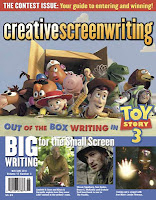First up, my sincerest apologies. Again. Two weeks missed in a row is not a good habit for me to get into. I could make a bunch of excuses about the
Ex-Heroesre-release and all the publicity work I’ve been doing, plus last week was ConDor con down in San Diego and I think I was on half a dozen panels over the weekend (including a writer’s workshop and an editing class). Not to mention I’m trying to finish the fourth
Ex book during all this…
Actually, those are pretty good excuses.
So, while I finish getting caught up, Thom Brannan has offered to step in with a post about scheduling your writing time.
(maybe I should’ve read this two weeks ago…)
* * *
Hello is all right.
I know, I know. You came here to glean some of Peter Clines’ wisdom, and what the hell is this? Right? I’ll do my best to keep your disappointment to a minimum.
My name is Thom Brannan, and some of you know me from
Cthulhu Unbound, some from
Survivors, some from
Pavlov’s Dogs, and some from filing restraining orders. Some of you don’t know me from Adam. This should help.
 |
| These are Adams. I am not one of them |
I’m here in Pete’s blog to help you with your writing. I’m not a guru, and if you’ve read my work, you’d probably agree. I’m probably only a notch above “adequate.” But one thing I do well is produce. I am a productive individual for someone who does not write for a living. And the reason for this is scheduling. So, I’m here to talk about scheduling and its importance for writers (and for any other creative endeavor, really) in my experience.
(It should be worthwhile to note, for the rest of this blog entry, whenever I say “it’s this way,” or “this is what works,” I’m speaking of what I’ve experienced
for myself and through others. I have
no guru hat.)
The first thing to realize is we are creatures of habit, all of us. Good habits, bad habits, everything in-between. It’s hard to break habits, so rather than suggesting you alter something about yourself that may require the assistance of a psychiatrist, let’s talk instead about forming good habits, which will hopefully be just as hard to break.
Pete has hammered home the point:
to be a writer, you must write. I agree wholeheartedly. I’ve found that doing it at the same time every day helps the process. Your body and mind know when it’s time to do something. There are things you do so often and so insistently that you feel off if you’re not doing them. Liken the creative process to a workout, and you’ll see what I mean.
These things are
part of your daily routine, and if you are fortunate to be able to carve out a niche in your day for writing, you should definitely do so. Allow me to share with you my experience.
After finishing work on Survivors, I had the opportunity to write a novel for the same audience. I leapt at the chance, and after wrestling with several ideas (and gathering input from friends) I chose one and got started.
I’d written before, but always for myself, or to have a Cthulhu Mythos story in my back pocket for whenever an anthology opened, or what have you. I had never written with a deadline before. Now, I know myself pretty well, and I know this is how I am: if you give me a deadline, that’s when I’ll turn it in. If you wanted it earlier, you’d have made the deadline earlier. Right? Right. That’s kind of crappy, and I want to change that.
So, to that end, I tried something new and scheduled myself some writing time. And, to keep myself honest, I tracked my daily and weekly progress in an Excel file. The first week, I averaged about twelve hundred pages a day, say five pages in
standard manuscript format. That seemed pretty good to me, and in keeping with Robert B. Parker’s self-enforced rule.
 |
| I felt like one of these, kind of. |
My second week of writing at the same time every day yielded slightly better results: eight pages a day. By week three, I was up to thirteen pages a day. By the last week of working on the novel, I was churning out eighteen pages a day.
I leaned to take the weekends off, which allowed the grey matter to decompress, and it kept me from burning out. I also only do this four weeks at a time, with four weeks off in between.
To date, when working on a solo project, I write an average of twelve SMF pages a day. Slightly less when collaborating, but that’s to be expected. Compared to a powerhouse wordfount like Eric S. Brown, it’s not very much. But if I compare it to my previous output of one or two pages a week, it’s a vast improvement.
I’ve also found that if I sit and play my guitar for five or ten minutes before writing,
that primes the pump, so to speak. But that’s me. Everyone has something different to get them started when it comes to write. I’ve read that Hemingway would leave off in the middle of a sentence. The proprietor of this very blog makes sure he has something left over from today’s writing time so he can write tomorrow.
So, there you have it. My 2¢ on scheduling. If I’m back at some point, I’ll likely blather on about collaborating.
Until then… well, you know what Pete says here.







